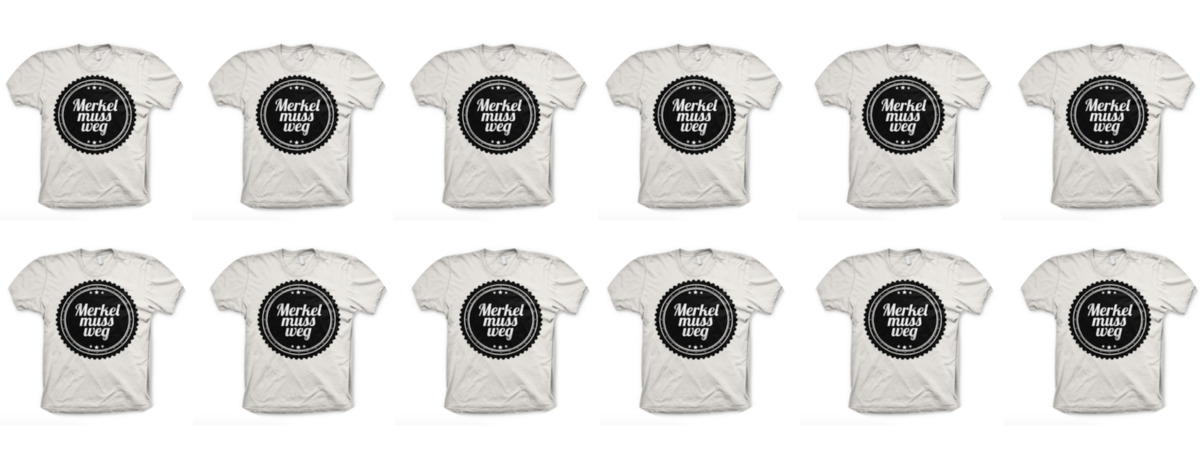#ElectionWatch: #MerkelMussWeg, explained
How fake news, a hashtag campaign, and inflammatory merchandise are coordinating a message that “Merkel MustGo”
#ElectionWatch: #MerkelMussWeg, explained

How fake news, a hashtag campaign, and inflammatory merchandise are coordinating a message that “Merkel Must Go”

As Chancellor Merkel maintains a comfortable lead in national polls ahead of German elections, an active campaign is unfolding online designed to portray Merkel as a dictator with no public support for her policies.
Fake and partisan news
Partisan and fake news websites in Germany consistently publish hyper-partisan or false stories critical of Angela Merkel’s policies, but the frequency by which they are published increased in the last couple of weeks.
The most recent example of a hyper-partisan news article smearing Chancellor Merkel was published by anonymousnews.ru — a German fake news website with connections to Russia that the @DFRLab investigated in January 2017 — and titled “Political prosecution under the Merkel regime: anyone who is involved in the AfD risks their life.” The article accused Merkel’s Christian Democratic Union (CDU), the media, and left-wing activists of persecuting and terrorizing Alternative for Germany (AfD) supporters, but provided no evidence to support the claim with its main source being a far-right German paper Junge Freiheit. It cited the left-leaning SPD’s “Stand Against Racism” campaign as an attempt to prevent far-right AfD from winning Bundestag seats. Although false, the article was shared more than 3,000 times on social media, primarily on Facebook.
Another example of a misleading story about Merkel was also published by anonymousnews.ru, titled “Just in time for the Bundestag elections: Merkel regime deletes tens of thousands of accounts from Facebook.” The article misrepresented Facebook’s efforts to counter the spread of hate speech, false information, and proliferation of fake accounts as an act of politically-motivated censorship. The article failed to explain that it is not Merkel’s “regime,” but Facebook deleting the fake accounts from its platform. The recently passed NetzDG law, also known as the social media law, does not require it, as it targets exclusively “criminal content,” i.e. hate speech, incitement to violence and threatening speech.
Fake stories about Germany are not limited to German language sites, a popular alt-right blog in the United States recently published an article accusing Merkel’s government of mass arrests of “anyone critical of Islam or Merkel’s policies.” The article stated the German government announced, “it would prosecute policemen who came forward with evidence that Cologne attempted to cover up multiple mass rapes because the perpetrators were Muslim.” The story was not factual. The story sited an express.de article about government’s intent to investigate the illegal leaks of classified information associated with the New Year’s Attacks case. The article’s source–Breitbart news–makes the distinction in an article titled “Germany looks to prosecute Cologne New Year’s Attacks Whistleblowers.” LibertyToday.net, however, intentionally misrepresented the facts of the case by suggesting an investigation into the leakers of classified information is somehow an indication of “mass arrests of anyone critical of Merkel’s policies or Islam.”
In fact, Buzzsumo analysis revealed the story was a duplicate originally published in July on epoliticsinfo.com, a partisan news outlet based in the United States.

Hashtag campaign
A separate campaign spread on Twitter with the hashtag “#Merkelmussweg” (#Merkelmustgo). The hashtag existed since at least January 2016, but experienced a coordinated uptick in usage over the last couple of weeks.
The recent increase can be partially attributed to the negative response Chancellor Merkel received at several rallies, which included far-right parties like Patriotic Europeans Against The Islamlisation of the West (Pegida) and AfD supporters chanting “skin her” in the small town of Annaberg-Buchholz in Saxony on August 17.
The incident was covered extensively by Kremlin-funded RT.
In just 13 days, #Merkelmussweg was mentioned 8,652 times by a small group of 3,337 users.

In fact, 61 accounts posted 1,932 tweets in less than 13 days, with the most active account, @darktweep, using the hashtag 194 times.
The #Merkelmussweg campaign first peaked on August 12, five days before the rally where Merkel was booed by AfD and Pegida supporters.

The breakdown of tweets per user shows a small group of Twitter accounts used the hashtag between 15 and 194 times in less than two weeks.

Most of these accounts belong to AfD supporters or bots; however, some appear to be American alt-right accounts. For example @KerriFreeman19, whose bio lists “nationalist” or “anti-globalist”, used the hashtag 55 times. The account’s profile picture is a painting, it posts on average 175 tweets a day, all of which indicate the account is a bot.

Merchandise
@DFRLab also found a “Merkel Muss Weg” store advertised on a Russian social network VKontakte (VK). It sells “Merkel Must Go” merchandise online.

While most of the merchandise is limited in calling for Merkel’s departure with “Merkel Muss Weg” written on it, others border on the line of hate speech.




WhoIs, a website for domain name registration and availability, revealed the site was created on February 16, 2016.

Two days later, the first link to the website appeared on VK, a Russian social network, shared by a user named Jennifer Walz.

Jennifer was the first one to share a link to the site, only two days after it was registered. Since, she shared the link to the website at least eight times on her VK wall.
Based on her VK posts, she is sympathetic to Nazi ideology:

She also describes herself as “ultraconservative”:

These findings reveal an ongoing low-key campaign to undermine Chancellor Merkel ahead of the Bundestag elections in September. Based on its spread, the campaign does not appear to have a strong effect on German information space, however, its intensity is likely to increase in the weeks leading up to the elections.
The @DFRLab will continue monitoring these developments.
Follow along for more in-depth analysis from our #DigitalSherlocks.


